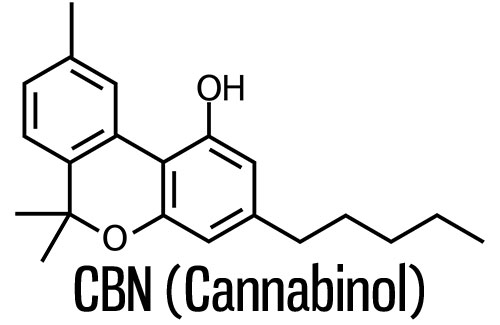What is Cannabinol and How Does it Work? Believe the Hype!
So, just what is cannabinol and how does it work? Cannabinol is a THC by-product used for seizures, sleep, and inflammation. Is it the next big thing? We have all heard of the effects of CBD and THC. These well-known cannabis compounds get most of the attention. In this ‘Age of Weed,’ cannabis users now want to know just is what is CBN cannabinol. As its benefits have long gone ignored, consumers are now using it to promote health. Users say it has all of the good benefits with less of the mind-bending effects. Now we can have our cake and eat it too.
The Cannabinoids
Chemists strive to isolate compounds from cannabis plant cannabinoids. The Cannabis Sativa plant and C. Indica subspecies given us over 100 distinct types. Their chemical groupings miss the mark on given them unique traits. Hence, their power to treat goes unsung. CBN is one of the isolates that shows promise in healing the body and brain. We only find this ‘new’ cannabinoid in small doses until the weed ages. As the compounds grow old and oxidize, mature THC breaks down to other products. As cannabis degrades, the aged cannabis THC-A breaks down to CBN-A. The further break down of CBN-A forms the end by-product CBN. Cannabinol forms slower than either CBD or THC, and in smaller amounts. In other words, as we have always known, even your old weed is good weed.
How Does the Next Big Thing Help?
The health benefits of CBN cannabinol are many. It boosts the immune system and fights inflammation. There is a notable showing of pain and anti-germ properties. It helps to prevent seizures and plays a role in thermal control. As a bonus, it shows a great deal of hope as an appetite stimulant.
Sleep and Sedation Benefits
According to the CDC, one-third of all Americans do not get enough sleep. As a result, they run a higher risk of getting a chronic illness. These include obesity, diabetes, and high blood pressure. These illnesses, in turn, lead to a risk of heart disease, stroke, or mental disorders. There are many options for the sleepless, ranging from holistic to drugs. Weed users can now add another type of herb option to the list.
In the search for better sleep aids, CBN may help promote restful sleep. It also maintains daytime alertness. Researchers did earlier mice studies with synthetic CBN derivatives. These studies showed the mice on CBN were more likely to stay asleep. CBN is a strong sedative, but we lack firm evidence for it to induce sleep. Research shows CBN helps people stay asleep. This action increases when it is combined with other compounds, like THC or CBD.
Much of the evidence we have about the use of CBN is anecdotal. The activity of CBN is weaker than THC on the CB1 receptors. As such, we should expect sedating effects as a generous side benefit. New clinical study trials are needed to study the full effect of CBN. Of course, this will require a change in the federal legal status of weed.
While we wait for supportive trials, newer sleep aids tout the effects of CBN. In sleep-deprived America, many users turn to these aids as an option. It may be worth trying one of them if you are not already. Above all, if you need a good night’s sleep. Of course, talk to your doctor about your options before using it.
Seizures
In this disorder, the brain shows low tolerance to some abnormal stimuli. These stimuli start a seizure and with it, all the resulting problems. Clinical signs of seizures depend on the site of the epileptic discharge. Drugs that help raise the brain’s tolerance to these discharges help reduce seizures. CBN as one such anti-seizure drug.
CBD cannabinoid has strong anti-seizure effects with epilepsy treatment. The Food and Drug Administration approved the drug Epidiolex in 2018. This CBD derivative has treatment effects in childhood seizures. The Lennox–Gastaut syndrome or Dravet syndrome are examples.
CBN appears less potent than CBD and THC. Despite this, it also works as an anti-seizure agent. CBN may extend seizure latency. In other words, the length of time it takes for a brain discharge to start a seizure. The anti-seizure action of CBN peaks at about 2 hours when given by mouth. Research suggests CBN may have treatment effects in many brain conditions. Parkinson's disease, catalepsy, and other illnesses may show benefit.
Anti-Inflammation & Immune Suppression
CBD and CBN both appear to fight inflammation and suppress the immune system. An anti-rejection effect blocks immune system interleukin-2 signaling. This rejection inhibits some of the immune cells and proteins in the body. CBN lowers the binding activity of some points in the immune response. This activity limits a pro-inflammation response to foreign bodies. It is a potential solution to fight certain types of cancer.
Because of its desirable traits, weed high in CBN shows promise. It may reduce long term inflammation caused by arthritis and Crohn's disease. It may help with autoimmune disorders, rheumatoid arthritis, and psoriasis. A great deal of study points to a role for cannabinol in the treatment of inflammation. Scientists are working to understand better how the human cannabinoid system affects the immune system.
Anti-germ
Research shows CBN can fight harmful bacteria. One study found CBN helpful in the treatment of MRSA infection. MRSA is a type of bacteria that resists the drugs used to treat it.
Anti-Pain Relief
Cannabinol modulates CB2 receptors to provide anti-pain properties. CB2 receptors modulate acute pain and inflammation and chronic pain. Pain that is related to muscle-spasm or surgical pain may benefit. CB2 receptors play a role in reducing cancer treatment and nerve injury. Cannabinol modulates pain signaling to relieve it. It also reduces local pain in tissue injury. This is key to pain relief from cancer and joint pain.
Another critical point is the activation of our CB2 receptors. CBN effects a separate pain pathway that THC also modulates. Like THC, CBN affects sensory neurons sensitive to capsaicin. This pain pathway represents another process involved in pain response. How does a good chili pepper make one feel like they are on fire? That is because they contain capsaicin, an ingredient that makes them hot. Topical medications contain capsaicin to reduce muscle and joint pain. When applied, this active ingredient triggers a sensation of heat.
Appetite Stimulation
Cannabinol has an opposite effect on CBD on appetite and eating. While CBD can suppress appetite, CBN acts as an appetite stimulant. Evidence suggests its benefits those who have a loss of appetite with weight loss. Cancer patients treated with drugs report cannabinol helps them keep a good weight.
Are Cannabinol Benefits Psychotropic or Mind-Bending?
Research has shown that CBN has mild psychoactive side effects. A 2008 British Journal of Anaesthesia report explains this contrast. Indeed, CBN's carbon double-bonds weaken its mind-bending traits. BJA found cannabinol 90% less psychoactive than THC. CBD, when coupled with CBN, reduced the latter's psychic effects. Therefore, it is unlikely that you will feel the same THC high. Products high in CBN will not induce a THC bliss, in other words, its marijuana without the high.
What is the Contrast with THC and CBD?
Plant cannabinoids, like CBN, CBD, and THC, are like our brain's cannabinoids. They each interact with our cannabinoid receptors in diverse ways. This interplay affects our physical and cognitive processes. Cannabinol modulates our nervous system. It affects the immune, digestive, and skeletal systems.
The derived CBN effects mirror those of THC with fewer psychoactive effects. Like THC, these have potential treatment targets in glaucoma and chronic pain. They both perform as a powerful sedative and sleep aid. They also may help with multiple sclerosis and to prevent seizures. A role in boosting one's appetite shows promise. This property helps those struggling from an appetite suppressing illness/treatment.
CBN is a different chemical compound than CBD. With this in mind, there is some relation to CBD. Some even consider the two to be "cousins." So there are many treatment parallels between the two cannabinoids. For example, both affect pain, inflammation, bacteria, and sedation. They also act against seizures and help treat bone fractures. They seem to have opposite impacts on appetite and anti-cancer power.
Human Endocannabinoid System
The body has two different types of cannabinoid receptors, CB1, and CB2. These receptors are on the surface of cells in different parts of the central nervous system. CBN, THC and CBD exert their effects through interaction with these cannabinoid receptors. Each receptor responds to different cannabinoids. This interaction with both receptors prevents the excess activity of neurons. Thus, in turn, reducing pain and other inflammation.
CB1 Receptors
CB1 receptors reside all over the body. There are high amounts of CB1 in the brain and spinal cord. CB2 receptors concentrate on peripheral nervous system immune cells. Natural endocannabinoids are made in the body and activate CB1. Compounds new to the body, such as weed or other drugs, can also trigger them.
CB2 Receptors
Activation of CB2 receptors works as an anti-inflammatory. Our body's first line of defense, inflammation, is an immune response. It plays a role in repairing numerous diseases and conditions. The THC and CBN in cannabis bind to both CB1 and CB2 receptors. This binding activates them like our own body's cannabinoids.
How Does It Work?
CBN mainly binds to CB2 cannabinoid receptors. These receptors distribute throughout the body. CB2 receptor proteins concentrate highly on our immune tissues and blood cells. These receptors modulate immune function. They fight against inflammation and also have anti-cancer promise. Low CB1 receptor affinity CBN explains the lack of THC-like psyche effects.
CBN works in synergy with other cannabinoids. It's more effective when combined with tetrahydrocannabinol THC and CBD. Research has studied anti-germ profiles of cannabinoid combinations. These included CBN, THC, CBD, CBG, and CBC. They conclude these activated cannabis-derived compounds are synergistic. When consumed together, they deliver potent antiseptic activity. This activity suggests that CBD and CBN help to resist bacteria.
Moreover, combining cannabinol with THC causes more sedation. It may also be more effective when smoked. Users taking cannabinol extract by mouth do not see this efficacy.
Is It Legal?
As weed is not FDA approved in the U.S. yet, federal restrictions limit its research. The U.S. list of scheduled controlled substances does not officially list CBN. However, the DEA could consider it "Schedule 1" as a ‘cannabis extract.’ So, the DEA might be able to prosecute CBN sale or possession. In brief, there is great confusion about the legal status of cannabinol.
More Research is Needed
The legal gray area surrounding its status limits CBN research dollars. Scientists have studied cannabinol for decades. Despite this, confirmed research is still in an ‘early phase.’ We need a more in-depth knowledge of its treatment potential. Clinical trials on both animals and humans on these effects are essential. The medical cannabis industry is booming in the United States. As such, the new funding allowance for analysis is growing. In time, we will realize the clinical promise of CBN.

Do You Still Have Questions about Cannabinol?
Read our related articles on using cannabis to treat inflammation. For more info, click “CBD Oil: Ins & Outs of Nature’s Cure-All.” Also, "CBD as Holistic Medicine? Explore the Possibilities". To learn more weed facts, visit our KindHealth medical marijuana FAQ page. If you are you thinking of giving CBN, THC, and CBD a try, give us a call at (786) 953-6838. Speak with our medical pot doctors. Schedule a visit and get your med card today!


Comments are closed.